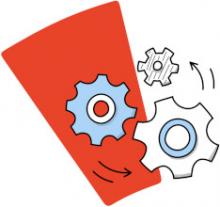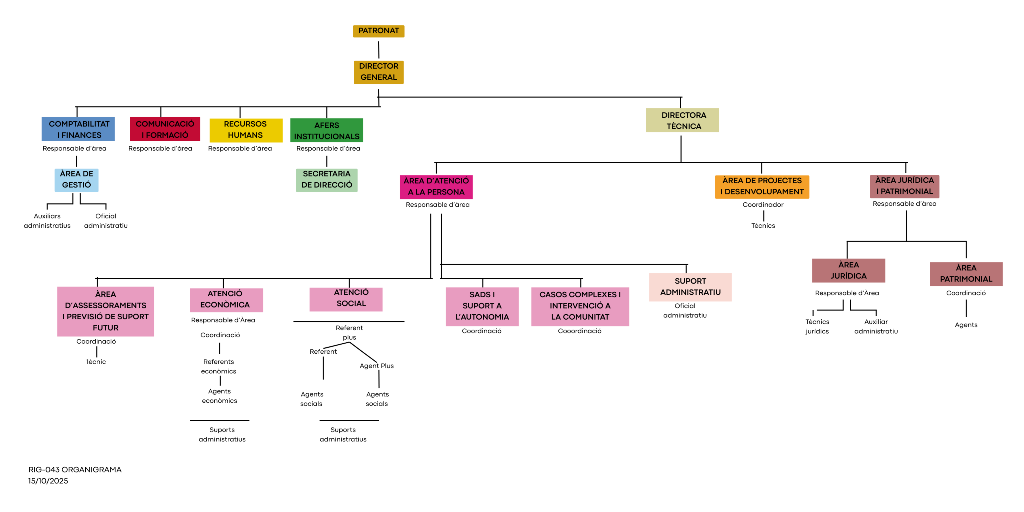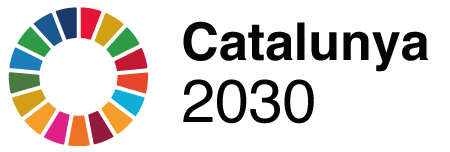Global, flexible and individual support

Support-Girona
Support-Girona is a private and non-profit organisation devoted to providing legal and social support to persons of any age with any type of disability, including psychosocial, intellectual, or aging-related, along with appropriate and effective safeguards to protect them from abuse by other people.
In Catalonia, it is the organisation with the largest number of assisted people, having supported over a 1000 people. This is owing to the fact that it has never rejected any case regardless of how complex the circumstances of the person’s environment and their reality may be. Around 34% of the situations that we at Support-Girona deal with are of high or medium complexity, and we usually act in extreme situations.
The main goal of Support-Girona is to defend, promote, develop, and extend the human rights of the people being assisted while helping them pursue their well-being with dignity and autonomy by providing them with legal assistance and social support while respecting the will, wishes, and preferences of each person.
Its field of action is the region of Girona.
Support-Girona facilitates support mechanisms designated by judicial appointment, notarial act, or self-consent, and it does so through a structure of over a 100 specialists, which include social workers, educators, psychologists, lawyers, and economists, among others.
The organisation also offers counselling services (which are not financed by the administration) to entities, specialists, and individuals, along with the Provident Service for Future Support, which aims to foresee the future needs of the disabled person themselves or their family members. Moreover, fostering and promoting the creation of programmes, resources, and social equipment in order to improve people’s living conditions is also part of the organisation’s goals.
Support-Girona works in a personalised manner by networking with all kinds of organisations and specialists in the public health and social services as well as people from the environment of the people being assisted in order to provide the support they may need when taking and managing decisions in any area of their life.
Support-Girona's work is mostly social and, thus, is performed very close to people. All its actions are coordinated with the supported person, along with their family members whenever appropriate, in a multidisciplinary manner with external specialists from other public/private social, health, or justice services of reference. The coordination between the social, economic, property, and legal areas of the organisation is key to guaranteeing the rights of the people in the exercise of their legal capacity.
Support-Girona's reference standard is the United Nations Convention on the Rights of Persons with Disabilities (CRPD), and it works along with the Sustainable Development Goals (SDGs) of the 2030 Agenda.
Legal system, governing and financing bodies
The organisation and working methods of Support-Girona are subject to the regulations relating to foundations, to the sector-specific regulations as a social service with public liability, and to civil legislation (i.e., state and Catalan, depending on the area of competence), reformed by the State Law 8/2021 and the Decree-Law 19/2021 of the Government of Catalonia as well as to the United Nations Convention on the Rights of Persons with Disabilities (CRPD), a human rights tool of international law whose hierarchy is higher than the state or Catalan legislation.
The organisation is governed by a Board of Trustees.
The members of the Board of Trustees are:
- Pere Cornellà Valls, president
- Francesca Blanch Roura, vice president
- Núria Martínez Barderi, board member and secretary
- Dolors Badosa Collell, board member
- Maria Combalia Garcia, board member
- Martí Masferrer Mascort, board member
- Pilar Monreal Bosch, board member
Support-Girona's funding base comes from grants awarded by the Department of Social Rights of the Government of Catalonia, which covers the basic income. Besides, it receives occasional aid from institutions, entities, and individuals, who make contributions in the form of donations or social work.
In August 2022, the organisation completed the procedures to work under a cooperative agreement with the Department of Social Rights of the Government of Catalonia, which is expected to replace its funding mechanisms in 2023.
Work philosophy
After the confirmation by Spain regarding the United Nations Convention on the Rights of Persons with Disabilities (CRPD, approved in New York in December 2006 and confirmed by Spain in November 2007, and entered into force on May 3, 2008), the organisation has been adapting its activity in accordance with the new principles. With the publication in 2014 of the general comment no. 1 by CRPD on Article 12, regarding the equal recognition of the person with disabilities before the law, the organisation was prompted to review its activities.
CRPD, in order to ensure that persons with disabilities enjoy dignity, individual autonomy, non-discrimination, full and effective contribution and inclusion in the society, respect for their differences, and equality of opportunities, forces all the ratifying states to cancel discriminatory provisions and fight against stereotypes and prejudices.
Being aware of this change of paradigm and the new approach introduced by CRPD, the organisation wants to play a decisive role in achieving its greater implementation. The organisation’s proven experience in the old guardianship service is the starting point for a full development of the support service for people in order to inspire confidence in the management of decisions and contributing to the generation of a more inclusive society, together with other social actors committed and aligned with human rights.
We at Support-Girona stand by the importance of independent living, which is an essential part of the autonomy and freedom of an individual. For persons with disabilities, being able to make, whether by themselves or with support, all the decisions that affect their lives, such as choosing where and with whom they want to live as well as determining their daily routine, personal relationships, clothing, nutrition, hygiene, healthcare, and all the activities pertaining to the religious, cultural, and sexual dimensions, is linked to the development of their identity and personality.
Therefore, we at Support-Girona support the idea of a life within the community, understood as all the places of social interaction and communicative relationships, such as having access to all of the services offered to the members of the community as well as the specialised services offered to persons with disabilities. This also includes housing, personal care, transportation, shopping centres, cinemas, and all the other facilities and services offered to the public.
To achieve this goal, the organisation employs the existing legal tools as supported decision-making mechanisms.
The organisation’s activities are based on the capacity-building strategy so that the people being assisted can make decisions regarding the management of the support they receive, which promotes their autonomy and supports their social inclusion. In order to achieve this goal, the organisation has adapted all the working procedures in its own quality plan based on human rights, seeking to reduce any intervention curtailing these rights when providing such support.
What is supported decision-making?
Supported decision-making mechanisms can take several forms, particularly with the United Nations Convention on the Rights of Persons with Disabilities (CRPD) entering into force in May 2008 and, more recently, the state and Catalan reform entering into force in September 2021. These include natural or professional support networks, support agreements, self-help groups, peer support, advanced support guidelines, and professional support services varying in intensity and duration. These mechanisms provide support for specific aspects of a person’s life or at a global level. Moreover, they are applied in a flexible manner and are based on the will and preferences of the person so as to respect their legal capacity.
Support-Girona has been evolving since 2014 by following the main principles of CRPD in order to create a system of support for legal capacity and provide assistance in the decision-making process while, simultaneously, offering safeguards for the exercise of the assisted person’s legal capacity and promoting their autonomy and full social inclusion within the community. The organisation addresses its practices in recognition of the right of each person to be involved in the decisions that concern them. Moreover, it promotes supporting the exercise of the rights and autonomy of the assisted person while respecting their will and preferences. Additionally, the organisation wishes to accomplish the following:
Integrate and spread the supported decision-making approach through dissemination information to society, services, and the professionals involved, whether from the healthcare or social areas or from the public or private sector (i.e., administration, banking, shops, etc.)
Create synergies of intersectoral cooperation and organising information as well as training sessions to seek the involvement and participation of key actors (i.e., users, families and experts) in order to implement, as much as possible, the principles of CRPD.
Find new ways to identify and implement effective safeguards to avoid undue influence and conflicts of interest while providing supported decision-making mechanisms to persons with disabilities.
Assist people so that they can recognise those situations where they may need support and then offering them that support.
Social Area
Traditionally, the organisation’s activities have been organised around three areas, which always operate in a network in order to provide overall care to each person. These are social, economic/property, and legal areas. At present, in order to maximise the joint efforts and bring them closer to people more precisely, we at Support-Girona are starting a pilot plan that considers an area of personal attention, formed by professionals from the social and economic areas, which will lead to a reshaping of teams and workspaces.
In this pilot reshaping, the legal area remains at the disposal of the area of personal attention for the legal aspects of the working plan involving people and would take over the tasks related to heritage property management.
The social area is formed by more than 70 professionals and is structured into 19 work teams for the entire territory of Girona. Each team has a mentor who receives the support of two or more actors according to the needs of the territory. Moreover, one person is in charge of coordinating the area. The mentor is responsible for the preparation and management of the assisted person’s working plan by taking into account their wishes as well as the agreement with external actors who may also play a part in conjunction with the economic/property and legal areas. The external actors carry out support on a daily basis by keeping close and frequent contact with the assisted person. The activities of Girona-Support is mainly social and, thus, involves being very close to people.
The actions are coordinated mainly with the assisted person but also involve their family members and, in a multidisciplinary manner, outside professionals of reference. Then, the corresponding social follow-up reports are prepared.
The care is also provided during emergency situations, 24 hours a day and 365 days a year.
The social area is structured into different working teams for the entire territory of Girona. Each team has a mentor who receives the support of one, two, or three supportive actors. The mentor is responsible for the preparation and management of the assisted person’s working plan by taking into account their wishes as well as the agreement with external actors who may also play a part in conjunction with the economic/property and legal areas. The external actors carry out this plan on a daily basis by keeping close and frequent contact with the assisted person. Their activities include:
- Preparing an individual comprehensive working plan for each new support in conjunction with the economic/property and legal areas
- Studying and processing, together with the economic area, the potential financial help that the person supported by the organisation may receive
- Studying the most appropriate care programmes or services to address each situation
- Multidisciplinary coordination with professionals of reference, providing assistance in emergency situations 24 hours a day, 365 days a year
- Preparing social reports to monitor the situation of the people being assisted
- Carrying out regular visits to the assisted people
- Carrying out interviews and coordinating with family members, centres, and/or entities related to the person being assisted by the organisation
- Managing the resources necessary to provide support for everyday shopping, medical visits, hospital admissions, leisure, cultural outings, and administrative procedures
Economic/property area
Traditionally, the organisation’s activities have been organised around three areas, which always operate in a network in order to provide overall care to each person. These are social, economic/property, and legal areas. At present, in order to maximise the joint efforts and bring them closer to people more precisely, we at Support-Girona are starting a pilot plan that considers an area of personal attention, formed by professionals from the social and economic areas, which will lead to a reshaping of teams and workspaces.
In this pilot reshaping, the legal area remains at the disposal of the area of personal attention for the legal aspects of the working plan involving people and would take over the tasks related to heritage property management.
The economic/property area, formed by around 20 professionals, works in teams together with professionals from the social area. The structure is complemented by administrative support, coordination support, and an area manager, with the aim of offering economic and heritage property support adapted according to the specific needs of the assisted person.
The purpose of the organisation is also to provide support and assistance to the person with regards to the administration and management of their income and expenses, heritage property management, or other types of financial assets. Therefore, Support-Girona informs the assisted person about their economic and heritage property situation, prepares a financial plan with them (reviewable), and looks after their economic rights. Its activities include:
- Preparing the inventory of assets of the people being assisted by the support service
- Managing heritage property (such as banking and real estate products) at the start and throughout the course of providing the support in order to guarantee the highest profitability
- Monitoring the income and expenses in a way that is adapted to the needs of each person being assisted
- Managing the tax settlement of persons being assisted
- Preparing the document to report annually to the courts on account of the person being assisted
- Participating as part of the housing committee
Legal area
The legal area is formed by a dozen professionals (including the head, coordination, technicians, and administrative support) and is the starting point of all the proceedings since it is the area in which the files are created, given that any assistance provided by the organisation begins with a court paper or a notarial deed. From here, it performs, either directly or indirectly, or coordinates the legal procedures that may appear in the life of the person being assisted in accordance with the powers conferred.
The legal and economic-property areas carry out important tasks of judicial, administrative, property, banking, and logistics management in order to relieve the professionals belong to the social area of these tasks and, thus, maximising their work.
The organisation does not start the legal proceeding for support; however, it takes part in the proceeding when it is appointed by the court in its capacity as the defender. This appointment can take place in the demands of the public prosecutor’s office when the person does not appear during the proceeding for their own defence and representation. In this case, the organisation is defending the rights and interests of the respondent only within the scope of the proceeding. To this end, it conducts some research on the personal, social, and family context and responds, if necessary, to the demand for support while taking part in this proceeding until the judgment is resolved.
Once the pledge has been made in court, the organisation provides support in each of the areas required, either directly or through hiring experts (pertaining to civil, criminal, administrative, and labour issues). This support is based on what is determined by the court resolution and, most of all, what is agreed upon with the person themselves so as to preserve their will and preferences. Its activities include:
- Participating when the organisation is appointed to conduct the legal defence of the person subject to the support proceeding
- Participating in the acceptance of new supports, collecting the information, registering the file in the database, and informing the different areas about the undertaken support
- Performing, whether directly or indirectly, or coordinating the legal procedures that may appear in the life of the person being assisted in accordance with the powers conferred
- Preparing all the documents required so as to comply with legal obligations and judicial requirements
- Assisting, together with the other areas, the people who is being provided support along with their families in the event of any circumstance or when in need of legal matters
- Promoting the proceedings in case it considers that the person being supported is entitled to a less restrictive measure or has the capacity for certain acts that have been judicially denied















